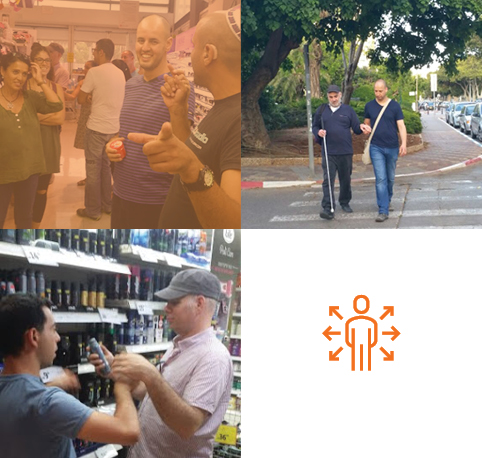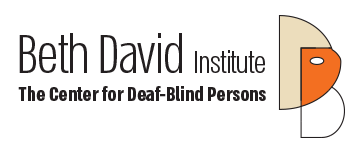
SSP Program: The Service Support Program (SSP) Program began in 2015 and is already one of our key programs. This service provides deaf-blind people access to many otherwise inaccessible resources in the community, as well as practical support. SSPs are contracted to provide visual and environmental information on a regular basis so that deaf-blind people can retain their independence.
What is an SSP?
Support Service Providers, or SSPs, are trained, sighted guides, and providers of visual and environmental information. This information enables deaf-blind people make informed decisions and allows them to participate in the wider (mainstream) community. Typical activities include: grocery shopping, reading mail, simple banking, running errands, and maintaining a healthy lifestyle through activities such as exercising, going for walks, etc.
SSPs may be hearing, deaf, or hard of hearing. They must be familiar with a wide range of communication modes and techniques used by deaf-blind people, including Israeli Sign Language.
SSPs are not interpreters. Communication assistance often occurs for short exchanges, but this assistance is limited. SSPs do not facilitate communication for important transactions such as the translation of a lease, a medical appointment, or the discussion prior to making a large-purchase; this would require a professional interpreter. The emphasis of SSP work is on visual and environmental (not verbal) information.
Paid Contractors
SSP’s are are paid, independent contractors who commit to provide SSP services to a deaf-blind individual on a regular monthly schedule. SSPs are paid an hourly rate for these services. Transportation costs\gas, entrance fees, and parking fees are paid by the deaf-blind person. Deaf-blind individuals who qualify for SSP services receive a set amount of hours each month for SSP services.
Volunteers
Volunteer SSPs are used for a variety of recreational activities. SSPs sometimes volunteer for social purposes, such as chatting, playing games, or trying out a new restaurant. This may be a regularly scheduled event or a one-time agreement for special occasions.
A personal story:
One SSP recently accompanied a deaf-blind woman to the zoo. It was a weekday, so it was not crowded and the animals were calm, without people disturbing them. The client, Tamara, loves animals and the zoo is a place where she feels calm and can learn about animals that interest her, their behavior, how they live, what they eat. She has some residual vision and could see the animals a bit from very close up. Given enough time she could absorb the description of their appearance and actions, study them carefully and understand what they were doing. She learned for example that giraffes have brown spots and enjoyed watching a penguin swim near here and smelling the fish that they were eating.
When they reached the tiger exhibit one tiger was outside and Tracy (the SSP) described its size, color, spots and how it was pacing back and forth. They stayed there for a long time, with Tamara using her residual vision to study the tiger and Tracy describing its movements as it continued to pace back and forth, back and forth… Tamara was fascinated by the tiger and eventually said that its behavior illustrates how deaf-blind people feel, locked up in their homes with no way to get out, left to pace from side to side. Tracy understood then that even though the tiger, like Tamara, lives with its family and could interact with them, that is not enough to alleviate the feeling of confinement and helplessness. Although she can go out with them, she is then dependent on their good will, time schedule and whatever explanations and information they choose to provide. This limits her freedom as well as her involvement in, and understanding of, the community. She needs an SSP, who can devote the necessary time to her, provide accessible descriptions, enable her to understand her surroundings and empower her to make her own decisions and choices.
The Center for Deaf-Blind Persons
The Center for Deaf-Blind Persons is Israel’s first and only center that provides specifically tailored services and programs to meet the needs of people who have the dual disability of deaf-blindness. The leading cause in Israel is Usher Syndrome, which is a genetic condition involving both hearing loss (from birth) and the progressive loss of vision throughout life.









